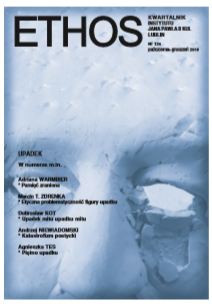Upadek człowieka jako choroba duszy. Diagnostyczno-terapeutyczny wymiar Platońskich dialogów
The Fall of Man as a Disease of the Soul: Diagnostic-Therapeutic Dimension of Platonic Dialogues
Author(s): Marcin SubczakSubject(s): Metaphysics, Ethics / Practical Philosophy, Ancient Philosphy, Health and medicine and law
Published by: Katolicki Uniwersytet Lubelski Jana Pawła II - Instytut Jana Pawła II, Wydział Filozofii
Keywords: Platonic dialogues; diagnosis; therapy; the fall of man;
Summary/Abstract: In this article, I address the diagnostic and therapeutic dimension of Plato’s writings. In the first part, I indicate that his dialogues are focused on the issue of the human soul. Plato, however, is interested—perhaps even more than in the metaphysics of the soul—in the problem of the lived experience of the presence of the soul as a rational and moral residuum of humanity. I refer to selected extracts from his dialogues in which the soul is described as what is most precious in man and simultaneously determining the essence of the human being. In the second part of the paper, I point to the fact that Socratic- Platonic concern for the soul has its origin in diagnosing the condition of the souls of the interlocutors of Socrates. I also claim that the context the dialogue as a genre introduces is perfectly suited to this task. I describe the course of the diagnosis in question, its nature and scope. Having observed that Plato’s diagnosis of the soul is largely negative and evokes the image of a sick soul, I discuss, in part three of the article, the essence of the fall of humanity, as well as the dimensions, manifestations, and consequences of this fall. The fourth part of the paper analyzes the therapeutic response of Plato to the condition of spiritual fall. The cure the philosopher proposes is philosophy understood as concern for the soul (psychagogy), encouragement to virtue (protreptic), and proper upbringing (paideia). I point to the fact that such philosophical therapy is recommended wherever Plato perceives a necessity of refining the human noetic skills that enable the cognition of a complex ontological structure. The purpose of this kind of cognition—the goal of Platonic therapy—is to know the Good, for the path towards it, as well as the knowledge of it, has the power to purify and elevate man from his fall, that is, to restore the natural harmony and order of human souls. To conclude, I emphasize that it is Plato’s implementation of his diagnostic and therapeutic strategy that gives unity and coherence to the philosopher’s thought, which develops consistently, beginning with the moment of the diagnosis: the recognition of the fall of man, which is followed by the proposal of a cure and, finally, by the soul’s return to its ‘natural’ good health.
Journal: Ethos. Kwartalnik Instytutu Jana Pawła II KUL
- Issue Year: 31/2018
- Issue No: 4
- Page Range: 81-94
- Page Count: 14
- Language: Polish
- Content File-PDF

